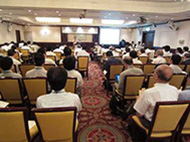Events
The Second Symposium on Development and Evaluation of Water Reuse Technologies for the Establishment of 21st century type Water Circulation System
Date: August 31, 2012
Venue: Mielparque tokyo, 2-5-10, Shibakouen, Minato-ku, Tokyo, Japan
Organized by:
Research Center for Environmental Quality Management, Graduate School of Engineering, Kyoto University
Co-organized by:
- Global COE “Global Center for Education and Research on Human Security Engineering for Asian Megacities”
- International Center for Human Resource Development in Environmental Management “Environmental Management Leader Program”
- Core Research for Evolutional Science and Technology/Japan Science and Technology Agency
Supported by:
- Ministry of Land, Infrastructure, Transport and Tourism
- Independent Administrative Institution Pubic Works Research Institute
- National Institute for Land and Infrastructure Management
Number of attendants: about 100
Report 216
Outline
In order to establish a novel urban water cycle system appropriate for the 21st century, we are going to develop novel water reclamation technologies for cascade use of river water, lake water, sewage and treated wastewater; to assess the developed technologies from the viewpoint of energy consumption for water transportation and treatment as well as control ability of risk agents in the reclaimed water; to characterize water application, safety levels of the reclaimed water by the developed technologies; and to evaluate the novel urban water cycle system applying the developed technologies from the viewpoint of integrated water resources management including water safety, energy consumption, and environmental effects. In this symposium, we will present the novel urban water cycle systems and propose a custom-made water treatment system suitable to specific areas.
Report
This symposium was be held as part of the research project titled ‘Development and Evaluation of Water Reuse Technologies for the Establishment of 21st Century Type Water Circulation System’, which is one of seven research projects of the first phase of the research area that started from October 2009, ‘Innovative Technology and System for Sustainable Water Use (Research Supervisor: Dr. Shinichiro Ohgaki, President, National Institute for Environmental Studies)’. This research area is one of the Core Research for Evolutional Science and technology (CREST) projects sponsored by Japan Science Technology Agency and focused on the creation of physical and/or social water management systems that would be adaptive measures for a variety of water issues caused by climate change or other factors.
Our research project aims to actualize ‘The 21st Century type Urban Water Circulation System’. In this symposium, we made presentations on development of water treatment technologies which could reduce energy consumption required for water treatment and control risk agents in reclaimed water. We revealed the possible use and safety of reclaimed water, and environmental impacts related with water reuse. We also presented the research on the new water treatment technologies by combing with membrane filtration technologies and oxidation processes such as ozonation and advanced oxidation process considering with different type of raw water. We evaluated the performance of proposed technologies in terms of not only conventional water quality standards but also removal rates of viruses and trace chemicals including unregulated chemicals such as disinfection by-products, and risks of reclaimed water for human health and ecosystems. In addition, we reported the classification of natural organic matter which causes undesirable phenomena in water/wastewater treatment processes. From these results, we can clarify the reductions in energy consumption rates required for water treatment and how safe the reclaimed water is, which could contribute to improvement and optimization for water/wastewater treatment process. We will also evaluate how much the proposed system can improve the water environment and save energy consumption compared with conventional water and wastewater systems, and propose custom-made water/wastewater treatment technologies for each local area.
In this symposium, researchers and engineers who are interested in existence technologies and water use joined. We had brisk discussions about urban water circulation system in the future after our presentations, which will reflect further progress of our research.

